
Thanks to applying new techniques in animal husbandry, Mr. Huynh Tien Khoa's cows are always of high quality.
High-tech cattle farming
Applying scientific and technological advances in livestock farming not only brings economic benefits but also changes farmers' awareness and practices. Up to now, Mr. Huynh Tien Khoa (Binh Thuy Hamlet, Hoa Khanh Dong Commune, Duc Hoa District, Long An Province) has over 15 years of experience in raising cows.
Mr. Khoa said: “In the past, my family raised cows using traditional methods, so the economic efficiency was not high. Later, thanks to participating in a cooperative and learning a lot of experience, I switched to raising cows using high technology. Since then, economic efficiency has increased, and my family's life has become increasingly prosperous.”
Initially, Mr. Khoa only raised 2 cows, seeing the effectiveness, he invested and expanded the barn. Up to now, his herd has over 30 cows with 4 breeds: Yellow cow, 3B cow, Tiger cow, Cream cow. Mr. Khoa added that since joining the cooperative, he has been trained in livestock knowledge, applied technical advances in improving the quality of the herd, taking advantage of the main food source being agricultural by-products, the cost of barns and veterinary medicine for disease prevention and treatment is not high, and the products are easily consumed. It is known that the Hoa Khanh Dong Commune Beef Cattle Breeding Cooperative has 51 members raising 180 cows, including 80 breeding cows. Joining the cooperative, farmers are also supported with vaccinations, disease prevention techniques for cows, and stable output products.
According to Mr. Khoa, raising cows is low risk but highly effective, and he can be proactive about time. In the morning, he cleans the barn, bathes the cows, and gets grass to feed them. At around 2 p.m., he feeds the cows with cassava residue mixed with food. In the evening, he only needs to give the cows straw to eat until morning. To prevent foot-and-mouth disease and lumpy skin disease in cows, he will actively spray disinfectant in the barn twice a week and vaccinate the cows once a month. If a cow is found to be sick, he must promptly isolate it from the herd and treat it. As for the remaining cows in the barn, he will inject medicine and spray disinfectant to prevent the spread. In addition, he also uses composted cow manure as fertilizer for grass and rice. Every year, after deducting expenses, he has a profit of about 200 million VND from raising cows.
Growing seedless lemons brings high income
Since determining that lemon trees are suitable for local soil conditions, Ben Luc district has focused on developing lemon growing areas, regularly organizing technical guidance on planting and caring for lemon trees, and transferring scientific and technical advances to farmers. Since then, many farming households have switched from growing sugarcane to growing lemons, especially seedless lemons, bringing higher economic efficiency.

Mr. Nguyen Van Tuoi has been a good farmer at district and provincial levels for many years.
Previously, Mr. Nguyen Van Tuoi (Hamlet 6, Binh Duc Commune, Ben Luc District) grew sugarcane. However, the price of sugarcane was unstable and there was no stable output, so in 2012, he converted some of his sugarcane growing area to grow seedless lemons. Seeing that lemon trees were suitable for the soil and brought high profits, in 2016, he converted all 4 hectares of cultivated land to grow seedless lemons.
Mr. Tuoi shared that growing seedless lemons only takes about 1.5 years to harvest the first crop. If using organic fertilizer, the tree can be extended to 6-8 years. Notably, this lemon variety bears fruit all year round, from the second year onwards the tree begins to yield high yields. Every 15 days, his family harvests fruit once, averaging about 3-4 tons/month. Thanks to signing a contract with a purchasing company, the price is stable, from 15,000-23,000 VND/kg of lemon, depending on the time. This price is about 5,000 VND/kg higher than the market price. Each month, his family earns a profit of about 30 million VND.
“Lemon trees are susceptible to spider mites, pink spots or scabs, but thanks to my application of the right dose of pesticides, organic fertilizers and proper planting techniques, the lemon garden rarely gets sick. In addition, using organic fertilizers in cultivation will help the trees grow and develop better, with less pesticide residues, and the soil will be less barren,” said Mr. Tuoi.
Growing melons in greenhouses - a potential economic model
The demand for clean agricultural products is increasing, so the construction of safe agricultural production models and the application of high technology in production are being responded by farmers. Currently, Mr. Nguyen Hong Quang (Binh An Hamlet, Thuan My Commune, Chau Thanh District) owns 5 greenhouses growing melons with a total area of 5,000m2 . According to Mr. Quang, the investment cost for each greenhouse is about 400-500 million VND.

Growing melons in greenhouses is a potential economic model.
The advantage is that he has many greenhouses, so he rotates each greenhouse to plant 15 days apart to ensure a continuous production process. Melon is a short-term crop, with stable prices and high economic efficiency. Mr. Quang said that melons can withstand the sun and heat very well, but cannot withstand cold weather, rain and dew, so they must be grown in greenhouses. In addition, growing melons in greenhouses will limit harmful pests and diseases. Melons are often infested with thrips, so before the new planting season, he cleans the greenhouse and sprays pesticides on the mesh walls to prevent thrips from entering.
Each melon crop lasts from 80 to 90 days, each fruit weighs about 2kg when harvested. According to Mr. Quang, to get the best quality melons, you have to wait until the vine has about 25 leaves, then cut off the top, leaving only 1 fruit on each vine to ensure the best quality fruit. With proper care, the greenhouse system ensures that the melons grow and develop well. On average, from 1 greenhouse, he harvests about 4 tons of melons. He has signed a contract with a purchasing company so the output is stable, grade 1 melons are sold at 30,000 VND/kg, grade 2 is 25,000 VND/kg. Each year, Mr. Quang's family earns about 200 million VND from 5 greenhouses growing melons.

Although the initial investment cost is high, if grown properly, melons will yield high yields and profits.
Currently, there are many high-tech agricultural production models being implemented by farmers. These models have been bringing high economic efficiency, contributing to providing the market with quality and safe agricultural products./.
Khanh Duy - Thu Thao
Source






















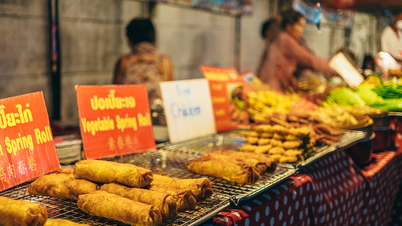






















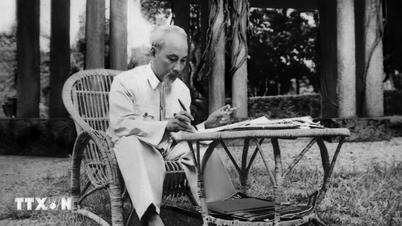


![[Maritime News] Wan Hai Lines invests $150 million to buy 48,000 containers](https://vphoto.vietnam.vn/thumb/402x226/vietnam/resource/IMAGE/2025/6/20/c945a62aff624b4bb5c25e67e9bcc1cb)











![[Infographic] Party Committee of the Ministry of Culture, Sports and Tourism: Marks of the 2020 - 2025 term](https://vphoto.vietnam.vn/thumb/402x226/vietnam/resource/IMAGE/2025/6/22/058c9f95a9a54fcab13153cddc34435e)










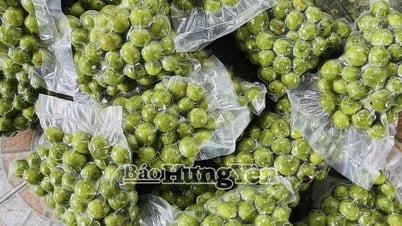



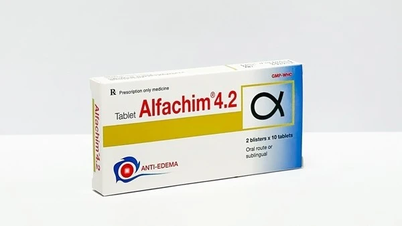

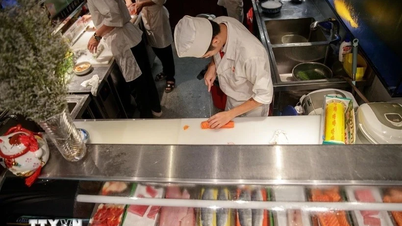











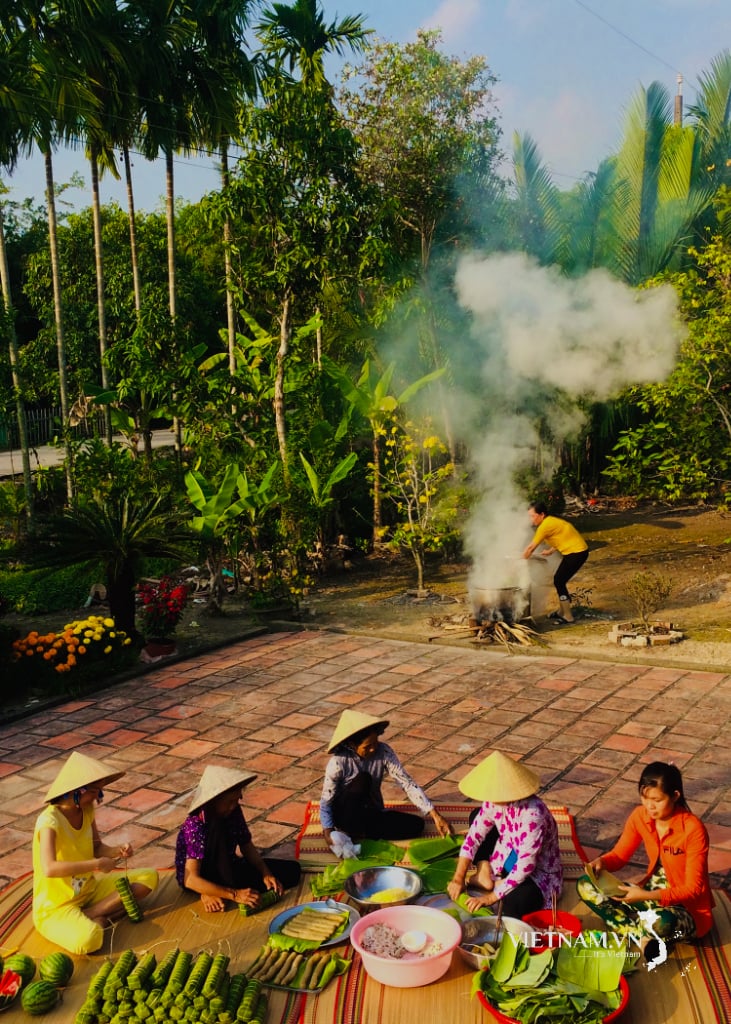

Comment (0)